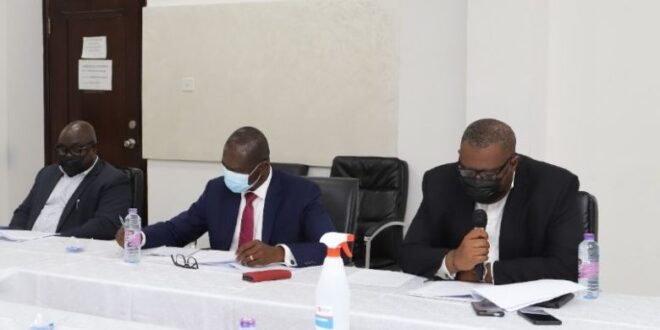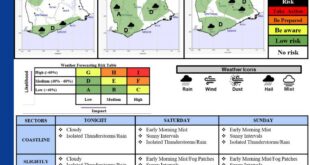Petroleum Commission, Ghana, the statutory body established to regulate and manage the utilization of petroleum resources and, coordinate policies in the upstream petroleum sector of the country has begun stakeholder consultations aimed at introducing a Safe Sea Access (SSA) Framework to regulate all users of the nation’s marine resources and to protect oil exploration infrastructure.
Since Ghana discovered oil on its shores in commercial quantities, there is evidence to show that the activities of fisherfolks have posed a major threat to the three (3) Floating Production, Storage and Offloading (FPSO) vessels namely, FPSO Kwame Nkrumah, FPSO Atta Mills and FPSO John Kufuor, currently exploring oil in the country.
Oil and marine life experts say this is because some fishermen have refused to observe the five hundred (500) metre safety zone prescribed by law as the distance from FPSOs where fishing is not allowed to take place. The experts further say that fishermen violate the safety zone regulation because the closer they are to the 500 metre safety zone, the “better catch” (trophy fish) they enjoy.
Legal Foundation
The introduction of the Safe Sea Access Framework is founded on the Petroleum (Exploration and Production) Act, 2016, (Act 919). Section 77 of the Petroleum (Exploration and Production) Act, 2016, (Act 919) titled Safety Zones, provides that; (1) Every petroleum facility and well shall be surrounded by a safety zone, unless otherwise determined by the Commission;
(2) The Commission shall, in consultation with relevant authorities, determine the delimitation of the safety zone;
(3) Unauthorized vessels, vehicles, fishing gear or other objects or crafts shall not enter a safety zone established under this section;
(4) The Commission may permit lawful activities to take place in the zone or in parts of the zone if the activities can be conducted without threatening safety or interfering with the exercise of the petroleum activities;
(5) The Commission may determine and establish the boundaries of the safety zone as prescribed before the placement of petroleum facilities;
(6) In the event of accidents and emergencies, the Commission may establish or extend a safety zone under subsection (5).
CEO of Petroleum Commission
Addressing the opening ceremony of the stakeholders meeting on Safe Sea Access Framework and Cumulative Impact Co-Management Platform today the 19th of May 2021, the Chief Executive Officer of the Petroleum Commission, Egbert Faibille Jnr. noted that as Ghana’s hydrocarbon exploration, development and production, which have been mainly offshore, intensified with about 18 acreages awarded to 16 companies, a key challenge has been the frequent and increasing incursions into the Advisory and Exclusion Zones by fishermen.
“Indeed, over 32,000 incursions have been recorded over the past five (5) year period. These breaches do not only place fishermen in grave danger but unnecessarily put critical offshore facilities and infrastructure at risk,” Mr. Faibille said.

According to the Petroleum Commission CEO, “The Petroleum Commission, as the sector regulator believes in consensus and would seize every opportunity to engage its key stakeholders on important national matters such as this.”
“We anticipate that by the end of the workshop, the participants will reach consensus in the following four (4) areas: firstly, a roadmap for the implementation of the Safe Sea Access Framework; secondly, a roadmap for the implementation of the Influx Management Plan; thirdly, funding the implementation of the Safe Sea Access Framework and lastly, funding the operation of the Cumulative Impact Management Secretariat,” Egbert Faibille said.
Fishing Sector Representatives
Representatives of the Fisheries Commission and the Ghana National Canoe Fishermen Council who participated in the stakeholders meeting observed that the activities of oil exploration companies are also having an adverse impact on their means of livelihood. It was their contention that the Ghana Navy in their bid to enforce the observance of the safety zone regulation by fishermen end up abusing the power given to them. They called on the Petroleum Commission to come to their aid in order to stop actions such as the seizure of their fishing nets by the Navy upon suspicion that the fisher folk are attempting to carry out their fishing activities within the 500 metre safety zone.
As part of the articulation of their interest at the workshop, the representatives of the fishermen noted that there is the need for oil companies to assure fishing communities that they will “be compensated should there be oil spills that affect their livelihoods or loss in their fishing rights due to oil and gas activities”. The representatives further pressed, “There should also be an intensification of the oil monitoring activities in order to forestall oil spills and associated impact on fish stocks and marine ecology.”
Source: Asaaseradio.com
Send your news stories to myghanamedia@gmail.com and Chat with us via WhatsApp on +233200818719
 MYGHANAMEDIA.COM Best Source Of Latest News
MYGHANAMEDIA.COM Best Source Of Latest News




